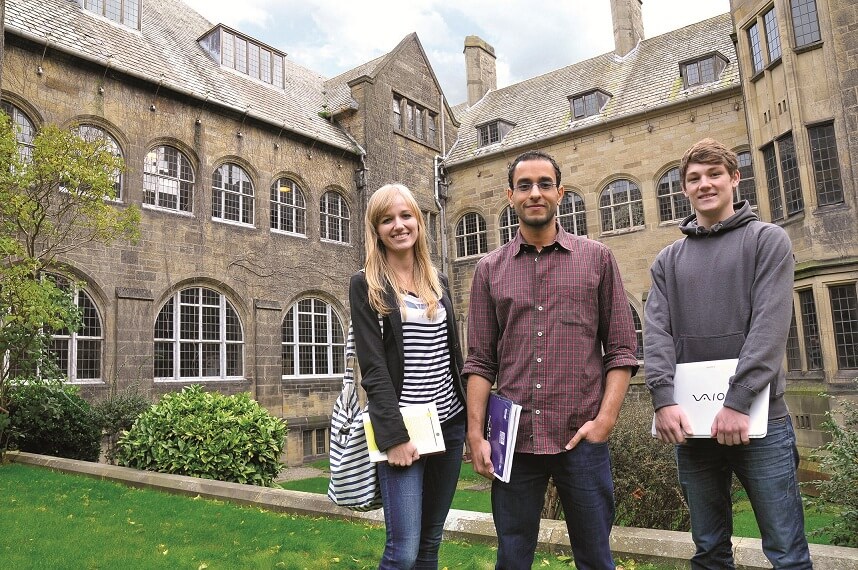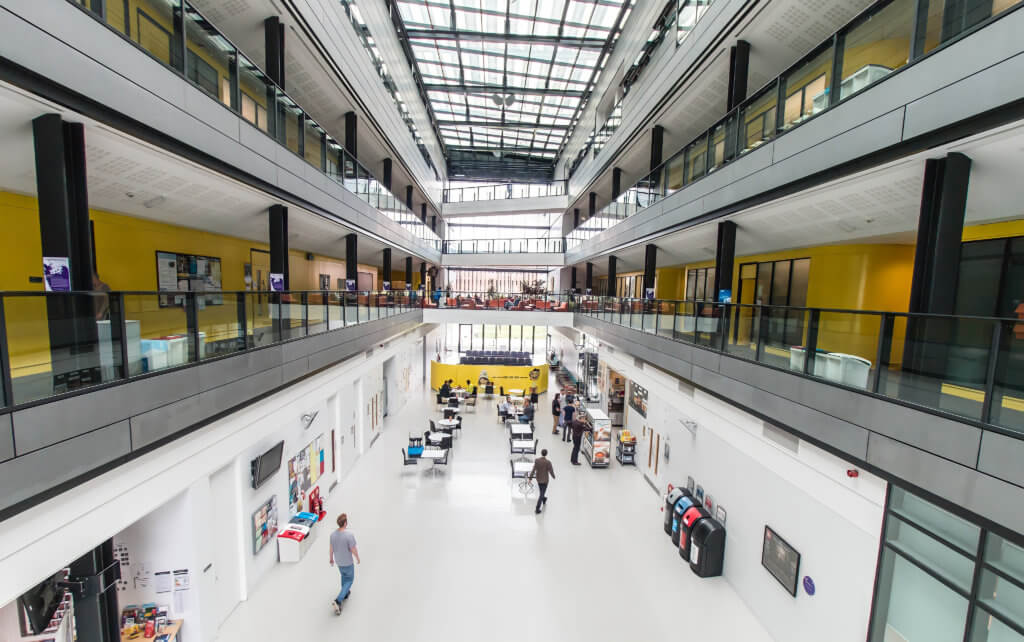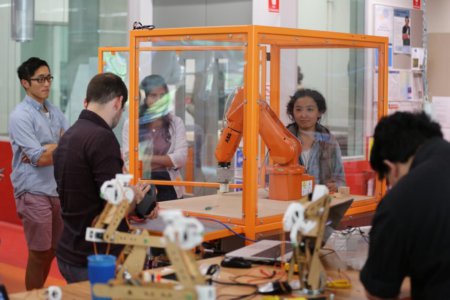
We are at the cusp of the Fourth Industrial Revolution, where the physical, digital and biological worlds are merging in unprecedented forms and scale. The McKinsey Global Institute estimates that by 2030, up to 375 million people could be displaced by automation. At the same time, new jobs would be created, possibly surpassing the number displaced.
New waves of technology such as big data, cybersecurity, software development, robotics and artificial intelligence (AI) have a wide range of uses in businesses. As they become mainstream and affect just about every industry imaginable, this means demand for computer science professionals who can tackle the challenges that come with digital transformation is more in-demand than ever.
Here are four universities preparing students for industry 4.0 through their stellar computer science programmes:
Glasgow Caledonian University

GCU has one aim: to be recognised as a world-leading university for social innovation. Source: Glasgow Caledonian University
What sets Glasgow Caledonian University apart is its excellent industry links. There are deep connections with professional bodies, programmes aligned to industry needs, and academic staff engaged in collaborative research with industry.
All of this provides numerous opportunities for students. This includes placements for undergraduates, support for relevant projects and embedded team work and skills needed by industry such as communications, and oral and written presentations. The result? A track record of success — 91% of graduates are in employment and/or further study, above the Scottish rate of 89% (HESA, Graduate Outcomes Survey, 2020).
If you seek a computing education in a vibrant, innovative and multi-award winning university, head to GCU. It is ranked 69th in the world overall out of 1,117 universities in the 2021 Times Higher Education (THE) University Impact Rankings and in the top 200 young universities in the Times Higher Education Young University Rankings 2020. It is also ranked second in the UK in Information Technology Systems according to the Complete University Guide 2022.
As a GCU student, you’ll stay ahead of the changing needs of the labour markets. The School of Computing, Engineering and Built Environment is home to eight departments that offer undergraduate programmes such as BSc programmes in Cyber Security and Networks; Digital Security and Forensics; Computing; Software Development for Business; Computer Games; Computer Games Art and Animation and AI and Data Science; and third year entry options in 3D Animation and Visualisation; Digital Design; and the Bachelor of Engineering in Computer Networking.
Those who want to specialise can opt for MSc courses in 3D Design for Virtual Environments; Advanced Internetwork Engineering; Big Data Technologies; and Cyber Security.
GCU aspires for more women to thrive in STEM. Both the university and school have the Athena SWAN silver award in recognition of their commitment to gender equality. To learn more about the school’s stimulating, unparalleled range of teaching and flexible delivery options, click here.
Bangor University

Students learn from some of the nations’ best. Bangor’s staff are among the world leaders in a broad range of technologies. Source: Bangor University
Founded in 1884, Bangor University brings students from all over the world together to experience outstanding learning standards. It is Top 10 in the UK for Student Satisfaction (Complete University Guide 2021).
The university’s School of Computer Science and Electronic Engineering is equipped with top facilities. This includes computer and networking laboratories, a state-of-the art electronic laboratory, extensive research laboratories and a Class 1000 electronics cleanroom.
Here, students learn from some of the nation’s best — Bangor’s staff are among the world leaders in a broad range of technologies, including AI and Pattern Recognition; Data Visualisation; Medical Microwave Electronics and Medical Simulation; Optoelectronics, Broadband and Optical Communications; and more.
The school offers undergraduate programmes in Computer Science; Computer Science with Game Design; Data Science and Artificial Intelligence; Data Science and Visualisation; Computer Information Systems; Computer Systems Engineering and more.
The master’s programmes prepare students to work in industry or research. This includes Advanced Computer Science; Advanced Data Science; Broadband and Optical; Computing; and Computing for Data Science. Students graduate with a firm grasp of the current practices and directions in this area, gaining the knowledge to help them design and build microscale devices.
The setting? A region of natural beauty between the mountains, lakes and forests of the Snowdonia National Park and the dramatic North Wales coastline. At its doorstep is The Isle of Anglesey (Ynys Môn), making Bangor University the perfect environment to study. In 2017, it was voted one of the best locations in the world to visit by Lonely Planet.
University of Manchester

Source: Shutterstock
Computer science is a fast-moving industry, which is why the University of Manchester’s Department of Computer Science prides itself on having its finger on the pulse of the industry. “The best environment in the UK for computer science and informatics research,” as the Research Excellence Framework 2014 goes, where the university was ranked in the top 5% in the UK for “research quality.”
The university is proud of both its department and city. From the pioneering “Baby” computer to the world-renowned work of Alan Turing, the department has, in no overstatement, changed the world. Some of the world’s first computing machines were produced by researchers in the department, and the first-ever stored-programme computer was created at Manchester, after all.
At the department — one of the oldest and most established in the UK, with five decades of pioneering developments in the field of computing — you will use specialist computing equipment, benefit from regular contact with accomplished tutors and leave with a degree attractive to leading employers. The department offers a wide range of undergraduate programmes in Artificial Intelligence; Computer Science; Computer Systems Engineering; Software Engineering and more.
Postgraduates programmes offered include Advanced Web Technologies; Artificial Intelligence; Computer Security; Data and Knowledge Management; Digital Biology; and Software Engineering. These programmes develop knowledge, technical skills and self-directed learning skills in data science, providing an excellent grounding for future work as a data scientist or analyst in industry.
Whichever level they’re at, Manchester students can expect high-quality, innovative research that is centred around solving real-world challenges; opportunities to showcase their own research; networking and contributions to international conferences and journals; as well as access to specialist equipment and first-rate facilities, including robotics.
University of Exeter

University of Exeter programmes are delivered by highly qualified staff. Source: University of Exeter
At the University of Exeter’s College of Engineering, Mathematics and Physical Sciences, programmes are business-linked and research-led. The college’s computer science research community includes experts in artificial intelligence, data science, machine learning, computer vision, high performance computing, the future internet, and evolutionary algorithms.
“We work closely with other disciplines on a wide range of projects and enjoy a fruitful relationship with a variety of business partners, collaborating on diverse projects that encompass engineering, IT, telecoms, water, aviation and biosciences,” shares Professor Ronaldo Menezes, Head of Computer Science.
At this department ranked sixth in the UK for Computer Science by The Times and The Sunday Times Good University Guide 2020, programmes are delivered by highly-qualified staff with a long-standing reputation for excellence in teaching. The environment is dynamic, the programmes challenging and facilities are up-to-date.
The college offers undergraduate programmes in Computer Science and Data Science. At the postgraduate level, the college offerings include the MPhil/PhD Computer Science and MSc in Research Computer Science. These programmes are underpinned by the latest technologies and strengthened by active collaborations with industry leaders providing practical experience through placements as well as educational partnerships.
“My time at Exeter provided me with a solid platform for starting a career in software engineering,” Gordon Murray Dent, a BSc Computer Science and MSc Applied Artificial Intelligence graduate, enthuses. “I learned the basics of Computer Science and began to develop a strong passion for coding and web development. It also introduced me to the importance of working as part of a team when building software during group projects — invaluable for anyone going into software development.”
*Some of the institutions featured in this article are commercial partners of Study International









